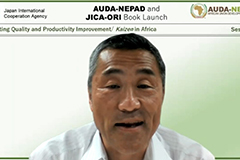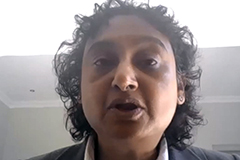Transforming African Industries With Kaizen: Book Launch Hosted by AUDA-NEPAD and JICA Ogata Research Institute
2022.07.07
On April 27, 2022, JICA Ogata Sadako Research Institute for Peace and Development (JICA Ogata Research Institute) co-hosted a webinar with the African Union Development Agency (AUDA-NEPAD) to celebrate the publication of the book “Promoting Quality and Productivity Improvement/ KAIZEN in Africa” which came out in February 2022. This was the second event for JICA Ogata Research Institute to collaborate with Policy Bridge Tank, the think tank unit of AUDA-NEPAD responsible for promoting knowledge co-creation.
The book is the second of a three-volume series to be published as part of the interim results of JICA Ogata Research Institute’s “Research Project on the Japanese Experience of Industrial Development and Development Cooperation: Analysis of Translative Adaptation Processes.” By introducing Kaizen promotion activities that JICA developed in Africa, the book discusses how development cooperation can assist the process of translative adaptation to customize Kaizen depending on the situation of each country.
George Murumba of AUDA-NEPAD, who served as the moderator, commented at the start that Kaizen is of great significance for all stakeholders involved in business in Africa.
Jin Kimiaki, a member of the Quality and Productivity Improvement (Kaizen) Project by the Economic Development Department of JICA, who was one of the two editors of the book, shared the book’s outline. He first clarified the key points of Kaizen while introducing topics covered in each chapter and provided an overview of JICA’s efforts in Africa. Starting from Tunisia, since 2006 to date, JICA has developed projects to promote Kaizen, a Japanese method of quality and productivity improvement, in nine African countries. Jin explained that recently JICA is working on the promotion of Kaizen at organizations and companies in each country by collaborating with AUDA-NEPAD to launch the Africa Kaizen Initiative and through the participation of the Pan African Productivity Association (PAPA). Furthermore, he stressed the need for practical research conducted through collaboration between practitioners and researchers, noting “If a company can create an organizational culture to promote Kaizen, it can become more resilient and adaptable to changes in the digital era.”

Jin Kimiaki, a member of the Quality and Productivity Improvement (Kaizen) Project by the Economic Development Department of JICA

Getahun Tadesse Mekonen, an Ethiopian certified principal Kaizen consultant
Getahun Tadesse Mekonen, who is an Ethiopian certified principal Kaizen consultant, gave a presentation on the six key success factors of Kaizen promotion in Japan and Singapore, which is the theme covered in the second chapter of the book. These are: (i) national commitment; (ii) institutional infrastructure; (iii) grassroot awareness raising; (iv) standardized training and consulting programs; (v) industry-academia-government partnerships; and (vi) capacity development in the private sector. Getahun said that most of these key success factors were below satisfactory in seven African countries where he collected survey data, putting all these countries at the initial learning stage toward implementing Kaizen. He then made eight proposals for the future, such as to encourage companies to actively bear some of the costs for Kaizen activities and to facilitate industry-academia-government collaboration.

Professor Norman Faull of the University of Cape Town
Professor Norman Faull of the University of Cape Town, the author of the fifth chapter of the book, gave a presentation about the Africa Kaizen Award (AKA). AKA is an initiative which started in 2019, to award companies working on Kaizen. The chapter looked at how the AKA system has contributed to enhancing productivity and quality improvement among the participating companies. Faull reported that there were 16 companies nominated from 10 countries in 2019. Survey results showed that the participating companies and nominators had different motives for engaging with the AKA. He concluded by saying that AKA is an initiative with great ambition, hence its aim cannot be achieved in a day. Therefore, it is imperative for all stakeholders to come together and continue on the initiative with a long term vision towards the development of the African continent.

Associate Professor Garth Shelton of the University of the Witwatersrand
Two discussants commented on the presentations. Associate Professor Garth Shelton of the University of the Witwatersrand highly praised the book by saying “I recommend it to anyone interested in the topic of economic development and productivity in Africa. I think the book is essential for anyone studying in this area.” Pamla Gopaul, AUDA-NEPAD, argued that Kaizen should be applied not only to manufacturing but to all industry types and sectors. She stated that “AUDA-NEPAD also sees Kaizen as a pre-condition for radical innovation.”

Pamla Gopaul, AUDA-NEPAD
In response to these comments, Jin mentioned the need to further refine existing methods to quantitatively assess Kaizen. He introduced that a study for Kaizen impact assessment on the South African automotive industry will be implemented by JICA,starting May 2022. Getahun remarked that he aspires to make the achievements made so far into national movements in each African country, and is looking forward to the continued collaboration with JICA and AUDA-NEPAD. Faull commented that currently in Africa, there is a high proportion of public sector employment. But if we have more private sector employment and competitive economy, it may lead to inducing totally different motives among the workforce population.
The webinar closed with words from Ohno Izumi, senior research advisor to JICA Ogata Research Institute (and professor at the National Graduate Institute for Policy Studies), the other editor of this book. Ohno noted that while Kaizen is a helpful method for productivity improvement, there are other important methods too. She stated that this kind of platform is very effective as it allows for multifaceted discussions, including various initiatives of AUDA-NEPAD. She concluded by expressing the institute’s hope to continuously co-create knowledge with African nations .
AUDA-NEPAD and JICA Ogata Research Institute Joint Book Launch Webinar (Session 2)

事業事前評価表(地球規模課題対応国際科学技術協力(SATREPS)).国際協力機構 地球環境部 . 防災第一チーム. 1.案件名.国 名: フィリピン共和国.

事業事前評価表(地球規模課題対応国際科学技術協力(SATREPS)).国際協力機構 地球環境部 . 防災第一チーム. 1.案件名.国 名: フィリピン共和国.

事業事前評価表(地球規模課題対応国際科学技術協力(SATREPS)).国際協力機構 地球環境部 . 防災第一チーム. 1.案件名.国 名: フィリピン共和国.

事業事前評価表(地球規模課題対応国際科学技術協力(SATREPS)).国際協力機構 地球環境部 . 防災第一チーム. 1.案件名.国 名: フィリピン共和国.

事業事前評価表(地球規模課題対応国際科学技術協力(SATREPS)).国際協力機構 地球環境部 . 防災第一チーム. 1.案件名.国 名: フィリピン共和国.
scroll